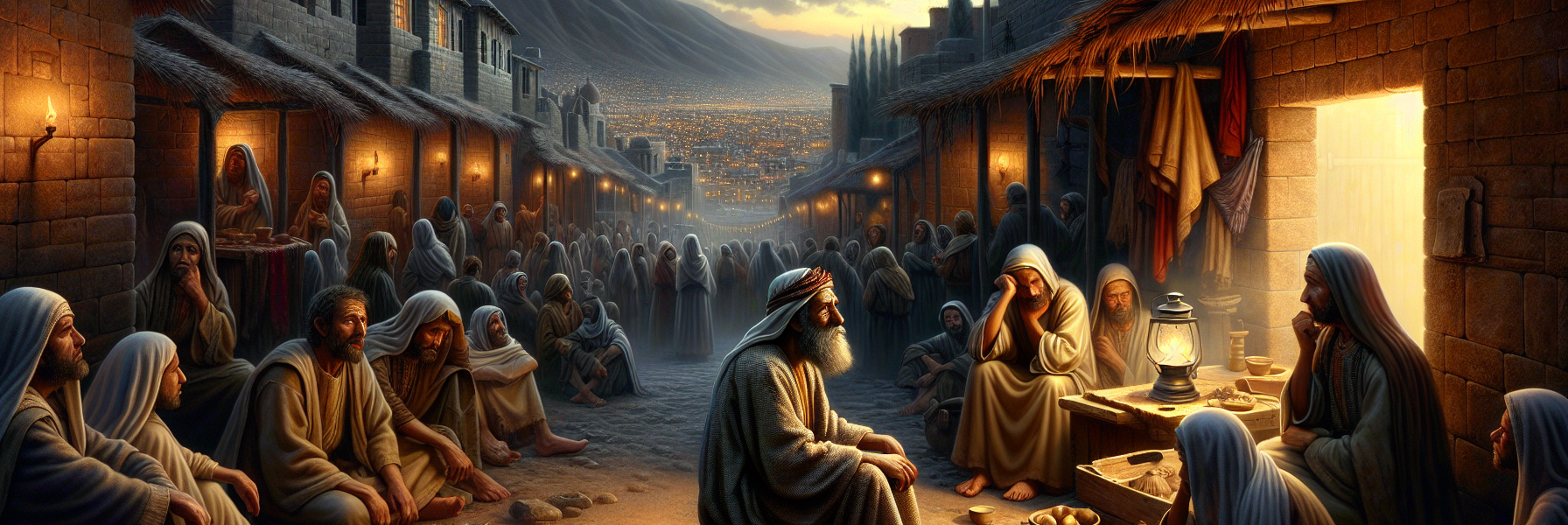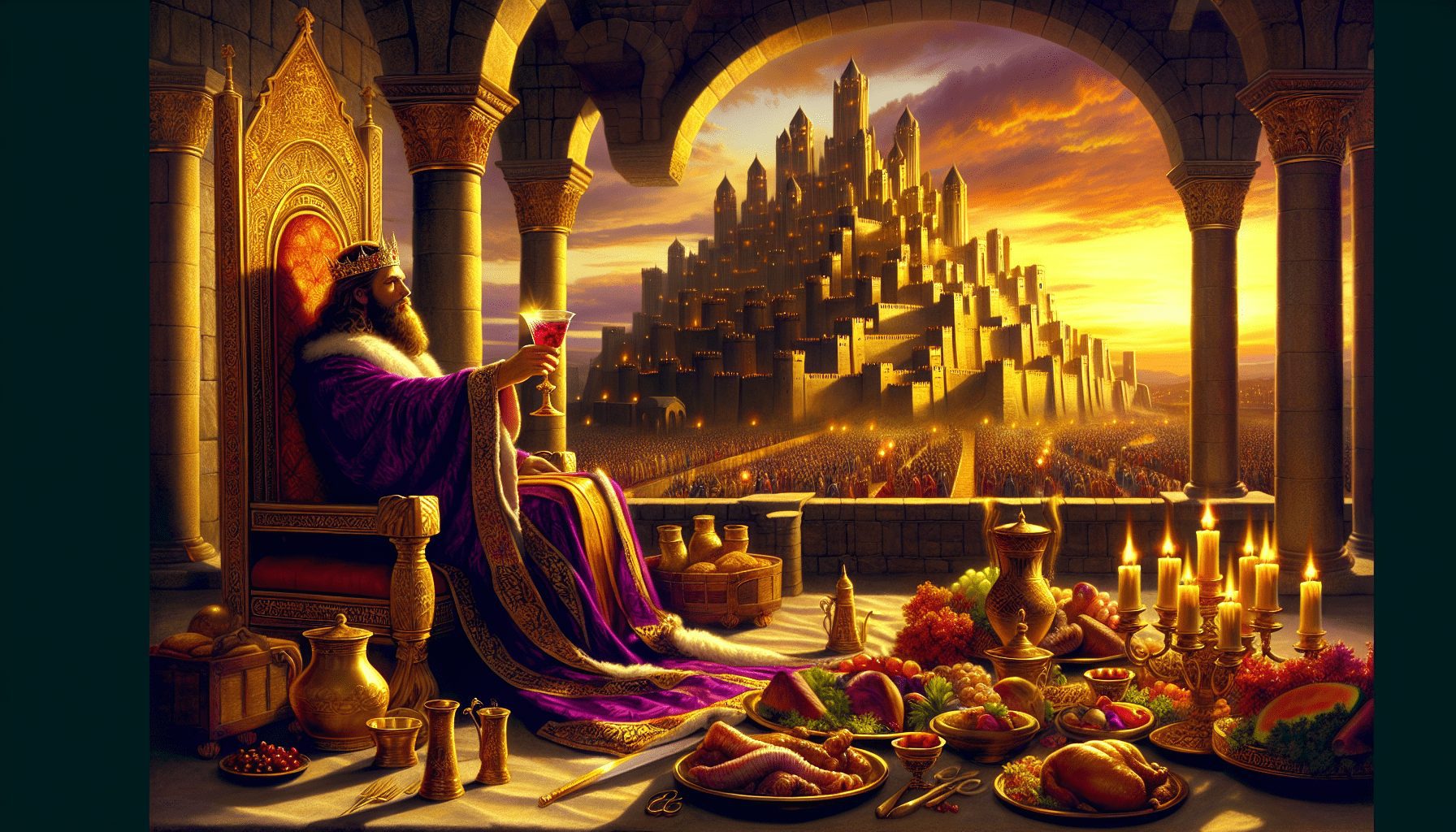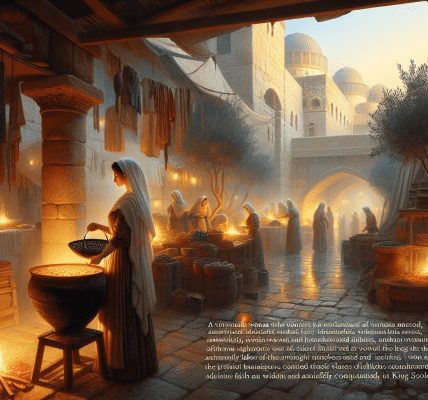**The Refiner’s Fire: A Story of Judgment and Mercy**
The sun hung low over the hills of Judah, casting long shadows across the dusty streets of Jerusalem. The city, once vibrant with the presence of God, now moved in a rhythm of half-hearted worship. The people went through the motions—offering sacrifices, keeping feasts—but their hearts were far from the Lord. The priests, weary and indifferent, performed their duties without zeal, and the people murmured against God, questioning His justice.
In the quiet of the evening, a man named Eliab sat at the threshold of his small home, his brow furrowed in thought. He was a Levite, though not of the priestly line, and he had seen the slow decay of faithfulness among his people. His father had spoken of the days when the glory of the Lord filled the Temple, but now, even the sacrifices seemed empty.
*”Where is the God of justice?”* the people whispered. *”Why does He not punish the wicked and reward the righteous?”*
Eliab sighed, his fingers tracing the worn edges of a scroll. He had read the words of the prophets, heard the warnings, and yet the people did not change.
Then, one night, as Eliab knelt in prayer, a vision came to him—a messenger, fierce and unyielding, standing before the throne of the Almighty. The messenger’s voice thundered like the rush of many waters:
*”Behold, I send My messenger, and he will prepare the way before Me. And the Lord, whom you seek, will suddenly come to His temple, even the Messenger of the covenant, in whom you delight. Behold, He is coming!”*
Eliab trembled, for he knew these were the words of the Lord. But the vision did not end there. The messenger spoke again, his words sharp as a two-edged sword:
*”But who can endure the day of His coming? And who can stand when He appears? For He is like a refiner’s fire and like fullers’ soap. He will sit as a refiner and purifier of silver; He will purify the sons of Levi and refine them like gold and silver, that they may offer to the Lord an offering in righteousness.”*
Eliab gasped. The Lord was coming—not in gentle mercy, but in purifying fire! The priests, the people—none would escape His gaze. The sacrifices, the tithes, the hollow words of worship—all would be tested.
Days passed, and Eliab could not shake the vision. He spoke to the priests, warning them, but they scoffed.
*”The Lord is slow to anger,”* they said. *”He will not judge us harshly.”*
But Eliab remembered the rest of the messenger’s words:
*”Return to Me, and I will return to you,”* the Lord had declared. *”Yet you say, ‘How shall we return?’ Will a man rob God? Yet you have robbed Me! But you say, ‘How have we robbed You?’ In tithes and offerings! Bring all the tithes into the storehouse, that there may be food in My house. Test Me now in this, says the Lord of hosts, if I will not open for you the windows of heaven and pour out for you such blessing that there will not be room enough to receive it!”*
Eliab knew the truth—the people had withheld their hearts and their treasures from God. They gave grudgingly, worshiped carelessly, and yet demanded His favor.
Then came the day of reckoning.
A wind swept through Jerusalem, not of dust, but of conviction. The Lord’s presence filled the Temple, not in cloud and fire as of old, but in piercing truth. The priests who had offered blemished sacrifices trembled. The merchants who had cheated the poor covered their faces. The people who had spoken arrogantly against God fell silent.
And Eliab, standing in the courtyard, watched as the refiner’s fire blazed.
Some repented, weeping as they brought their full tithes, their honest offerings, their contrite hearts. To these, the Lord showed mercy, healing their land, blessing their faithfulness. But the hardened, the unrepentant—they could not endure the heat of His holiness.
When the fire had done its work, a remnant remained—purified, renewed. And the Lord spoke softly to them:
*”They shall be Mine, says the Lord of hosts, on the day that I make them My jewels. And I will spare them as a man spares his own son who serves him.”*
Eliab bowed his head, tears streaming down his face. The Lord had come—not to destroy, but to redeem. Not to condemn, but to cleanse.
And in the stillness of that holy moment, he understood: the refiner’s fire was not their end, but their hope.
For the Lord had promised:
*”Return to Me, and I will return to you.”*
And so, they did.




